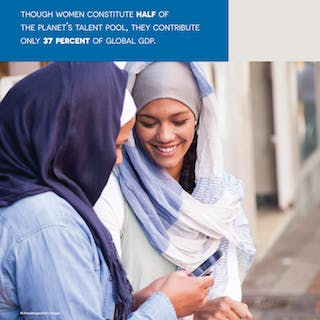
Today, the United Nations Foundation and BNY Mellon, a company known for its investment expertise and a deep commitment to diversity, are releasing a report about promising and less explored market-based opportunities that could fuel the global movement to achieve Sustainable Development Goal 5: “Achieve gender equality and empower all women and girls.”
The report, Return on Equality: Investment Opportunities to Help Close the Global Gender Gap, notes that “Achieving gender equality is essential as a matter of justice and human rights – and it also unleashes a range of positive economic and development outcomes.”
Highlights from the report include the following:
1. There is a promising yet currently under-appreciated opportunity in gender-lens investing: investing in companies that promote gender equality through their products and service offerings.
2. Achieving parity across products and services in just five sectors – water, contraception, telecommunications, energy, and child care – could unlock $300 billion in incremental annual spending by 2025.
3. These sectors map to the targets of Sustainable Development Goal 5, but this analysis can be applied to other sectors, such as financial inclusion and consumer products. So our estimate may be the proverbial “tip of the iceberg.”
4. There is some work to be done before this opportunity can be fully realized. The report lists, for example, critical enablers for greater investment in the products and services arena, and suggests a call to action for the investment community, individual investors, and other actors who can help develop the metrics and certification systems needed to identify qualifying investments.
5. In addition, while the report focuses on some of the supply-side barriers that disadvantage women, there are demand-side barriers, including entrenched social norms and discrimination, which will require action and policy leadership to further “unlock” women’s access to essential products and services, such as mobile phones, clean water and modern contraceptives.
Ensuring women’s and girls’ equality is a clear moral imperative. But closing the gender gaps can also unleash substantial and unrealized social and market benefits. We hope shining a spotlight on these will engage new actors – and new solutions – that will advance the aspiration for gender parity more quickly and more sustainably.
Click here to read the report.

